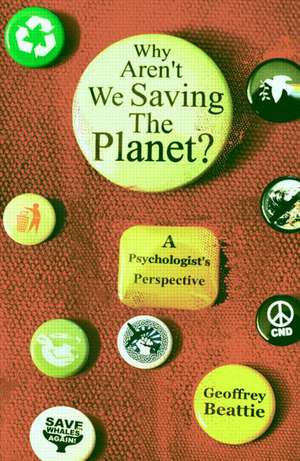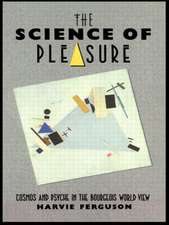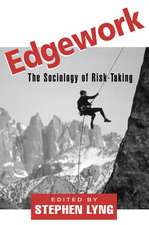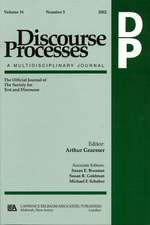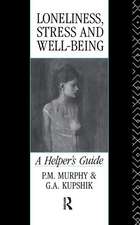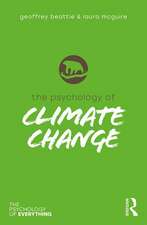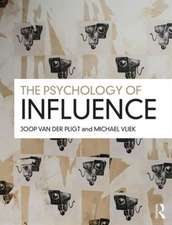Why Aren't We Saving the Planet?: A Psychologist's Perspective
Autor Geoffrey Beattieen Limba Engleză Paperback – 5 mai 2010
So why aren’t we already saving the planet? This book follows one psychologist’s mission to find some answers to this question. Challenged by a student to use psychology to find the root of the problem, Geoffrey Beattie (an environmental "unbeliever") begins a personal and life-changing journey of discovery. The reader is invited to accompany him as he uses psychological methods to examine people’s attitudes to global warming. Along the way we find the author’s own attitudes being challenged, as well as our own.
This ground-breaking book reflects new and innovative research being carried out into how to change attitudes to the environment and how to encourage sustainable behaviour. It is eminently readable and interesting and, as such, should be read by anyone who is concerned about the future of our planet. In fact, you should also read it if you’re not concerned about our planet.
Preț: 139.66 lei
Preț vechi: 169.08 lei
-17% Nou
Puncte Express: 209
Preț estimativ în valută:
26.72€ • 27.98$ • 22.11£
26.72€ • 27.98$ • 22.11£
Carte tipărită la comandă
Livrare economică 07-21 aprilie
Preluare comenzi: 021 569.72.76
Specificații
ISBN-13: 9780415561976
ISBN-10: 0415561973
Pagini: 284
Ilustrații: 23 tables
Dimensiuni: 129 x 198 x 23 mm
Greutate: 0.32 kg
Ediția:1
Editura: Taylor & Francis
Colecția Routledge
Locul publicării:Oxford, United Kingdom
ISBN-10: 0415561973
Pagini: 284
Ilustrații: 23 tables
Dimensiuni: 129 x 198 x 23 mm
Greutate: 0.32 kg
Ediția:1
Editura: Taylor & Francis
Colecția Routledge
Locul publicării:Oxford, United Kingdom
Cuprins
1. Motivations Implict and Explicit. Part 1. Notes on Attitude. 2. Small Things Can Make a Difference. 3. Measuring Attitudes to Sustainability – Easily, Consciously and Wrongly? 4. The Man Who Changed a Fortune Cookie and Started a Revolution. 5. The Missing Ingredient is Now Available. 6. Uncovering Implicit Attitudes to Carbon Footprint. Part 2. Notes on Perception. 7. Unconscious Eye Movements and What the Brain Sees. Part 3. Notes on Habits. 8. Eden Reclaimed. 9. Old Habits. Part 4. Notes on Dissociation. 10. In Two Minds. 11. Speech and Revealing Movement. 12. In Search of the Green Fakers (In Search of Myself). 13.Taking Big Risks. Part 5. Emotion and Thought. 14. An Inconvenient Truth? 15. Reaching Boiling Point? 15. Some Conclusions and Some Action Plans. References.
Recenzii
"The planet is in peril on account of human activity. Politicians, philosophers, and various pundits have been proposing ways to reverse the destructive thrust of this activity. Nothing has worked. The reason is that the activity has never been examined in itself as a product of cultural forces. This brilliant book does exactly that and thus provides an enlightened way towards changing the course of human history. By focusing on the signifying cultural roots of destructive human activity, it has opened up a veritable practical path to solving the crises facing the planet. This is required reading for everyone who is interested in our survival." - Marcel Danesi, University of Toronto and Editor of Semiotica
"Many people see consumers as pivotal to helping solve climate change issues. But getting them on board may be a very complex process. Geoffrey Beattie's book represents exactly the type of visionary thinking that is now needed to improve the efficacy of communication in this critical area. His work demonstrates a real milestone in the ability to unravel, understand and change the attitudes of the public and more importantly, their behaviour" - Fran Cassidy, Director, The Marketing Society
"While the unconsciousness of gesture is widely acknowledged, his analysis is the first where it has been systematically exploited, rather than just noted as an interesting fact. From his insight important conclusions follow. The narrative of the book leads to the observation that there are significant though subtle mismatches between unconscious gesture and articulated speech. Yet the unconscious can impact action. The final chapters draw on these lessons to outline new forms of persuasive communication regarding climate change" - David McNeill, Center for Gesture and Speech Research, University of Chicago
"…A thought-provoking, engaging personal account coupled with actual psychological research on this most pertinent global issue." – Fidelma Butler in The Psychologist
"The planet is in peril on account of human activity. Politicians, philosophers, and various pundits have been proposing ways to reverse the destructive thrust of this activity. Nothing has worked. The reason is that the activity has never been examined in itself as a product of cultural forces. This brilliant book does exactly that and thus provides an enlightened way towards changing the course of human history. By focusing on the signifying cultural roots of destructive human activity, it has opened up a veritable practical path to solving the crises facing the planet. This is required reading for everyone who is interested in our survival." - Marcel Danesi, University of Toronto, Canada, and Editor of Semiotica
"Many people see consumers as pivotal to helping solve climate change issues. But getting them on board may be a very complex process. Geoffrey Beattie's book represents exactly the type of visionary thinking that is now needed to improve the efficacy of communication in this critical area. His work demonstrates a real milestone in the ability to unravel, understand and change the attitudes of the public and more importantly, their behaviour" - Fran Cassidy, Director, The Marketing Society
"This is a beautiful work, artistic and literary. The reader is led through the methods and data with a sure hand, and surprises pop up with charm and a generous concern for the reader. I especially admire Geoff's honesty and courage in using his own self as a kind narrative protagonist." – Professor David McNeill, Center for Gesture and Speech Research, University of Chicago, USA
"Many people see consumers as pivotal to helping solve climate change issues. But getting them on board may be a very complex process. Geoffrey Beattie's book represents exactly the type of visionary thinking that is now needed to improve the efficacy of communication in this critical area. His work demonstrates a real milestone in the ability to unravel, understand and change the attitudes of the public and more importantly, their behaviour" - Fran Cassidy, Director, The Marketing Society
"While the unconsciousness of gesture is widely acknowledged, his analysis is the first where it has been systematically exploited, rather than just noted as an interesting fact. From his insight important conclusions follow. The narrative of the book leads to the observation that there are significant though subtle mismatches between unconscious gesture and articulated speech. Yet the unconscious can impact action. The final chapters draw on these lessons to outline new forms of persuasive communication regarding climate change" - David McNeill, Center for Gesture and Speech Research, University of Chicago
"…A thought-provoking, engaging personal account coupled with actual psychological research on this most pertinent global issue." – Fidelma Butler in The Psychologist
"The planet is in peril on account of human activity. Politicians, philosophers, and various pundits have been proposing ways to reverse the destructive thrust of this activity. Nothing has worked. The reason is that the activity has never been examined in itself as a product of cultural forces. This brilliant book does exactly that and thus provides an enlightened way towards changing the course of human history. By focusing on the signifying cultural roots of destructive human activity, it has opened up a veritable practical path to solving the crises facing the planet. This is required reading for everyone who is interested in our survival." - Marcel Danesi, University of Toronto, Canada, and Editor of Semiotica
"Many people see consumers as pivotal to helping solve climate change issues. But getting them on board may be a very complex process. Geoffrey Beattie's book represents exactly the type of visionary thinking that is now needed to improve the efficacy of communication in this critical area. His work demonstrates a real milestone in the ability to unravel, understand and change the attitudes of the public and more importantly, their behaviour" - Fran Cassidy, Director, The Marketing Society
"This is a beautiful work, artistic and literary. The reader is led through the methods and data with a sure hand, and surprises pop up with charm and a generous concern for the reader. I especially admire Geoff's honesty and courage in using his own self as a kind narrative protagonist." – Professor David McNeill, Center for Gesture and Speech Research, University of Chicago, USA
Descriere
This book follows one psychologist’s mission to find out why we aren't saving the planet.
